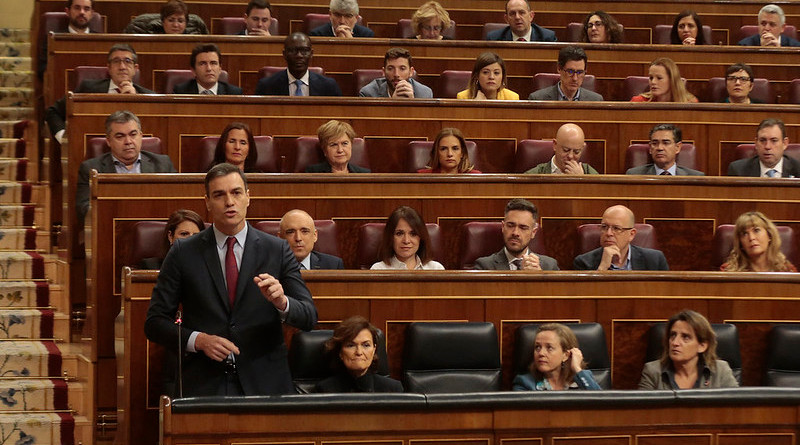‘Spain Cannot Be Defended If Its Diversity Is Not Accepted,’ Says PM Sánchez
While speaking in the Lower House of Parliament, Prime Minister Pedro Sánchez stressed that the Government of Spain will guarantee equality between Spaniards through fiscal justice, the welfare State and parliamentary and regional dialogue. Furthermore, he argued that the European Union should be given the budget it needs to implement its strategic agenda.
At the government control session in the Lower House of Parliament, Pedro Sánchez highlighted the gaps in equality that exist in Spain in social, gender, regional and inter-generational issues. In response to a question from Pablo Casado of the Popular Parliamentary Group, Sánchez expressed the Government of Spain’s commitment to equality between Spaniards, a goal to be supported by three pillars: a fair fiscal policy; reconstruction of the welfare State; and dialogue.
Pedro Sánchez went on to explain in detail that this dialogue will be undertaken with the various parliamentary groups and regional governments throughout the term of this legislature. He reiterated his willingness to seek common ground with the opposition in the best interests of Spain and the Spanish people over the next four years. In terms of regional affairs, he said that “Spain cannot be defended if its diversity is not accepted” and that “equality and uniformity” should not be confused.
To demonstrate that commitment from the Government of Spain, Pedro Sánchez highlighted the understandings reached in three areas this week: the Royal Decree-Law approved by the Council of Ministers following dialogue with the farming sector; the Dialogue Committee with the Regional Government of Catalonia that is being launched on Wednesday; and the first meeting of the Delegate Committee for the Demographic Challenge in La Rioja next Friday.
Rapprochement between Catalans and with Spain as a whole
Sánchez said that the Government of Spain will attend the meeting with the Regional Government of Catalonia at Moncloa Palace “with the best of spirits”, knowing that it is the start of a “difficult, complex and long” road, and with the wish for that road to lead to “rapprochement between Catalans and between Catalonia and the country as a whole”.
In response to a question from Laura Borràs of the Plural Parliamentary Group at the government control session, Sánchez recalled that five regional elections have been held in Catalonia in the last ten years and that the pro-independence parties did not achieve a social majority in those elections, meaning that those forces should accept that “Catalonia is plural, as is the rest of Spain,” and recognise that “non-minority” part of the Catalan people who do not agree with either independence or the “unilateral drift” of the pro-independence movement.
Pedro Sánchez then said that, following a decade of discord, grievances and recriminations, a period of dialogue is now underway that the Government of Spain hopes will lead to rapprochement between Catalans and between Catalans and the rest of their compatriots in Spain.
An ambitious agenda for Europe
In the Lower House of Parliament, Sánchez reiterated the position defended by the Government of Spain at the European Council held last week on the Multi-annual Financial Framework, in response to a question Aitor Esteban Bravo of the Basque Parliamentary Group. Pedro Sánchez said it is essential that the EU be given a sufficiently extensive budget for it to undertake the “ambitious” strategic agenda for the years ahead that has already been agreed by the European institutions, so an agreement heading in that direction must continue to be sought over the coming weeks.
Furthermore, Pedro Sánchez advocated no distinction between the resources allocated to modernisation and those allocated to traditional policies that are positive for Spain, such as the Common Agricultural Policy (CAP) or the cohesion funds. He also defended safeguarding the conditional nature of both the rule of law and the social state in the next budget and finally opening a debate on how to finance European policies with internal resources at a supranational level.
As regards the major challenges faced by Europe, Sánchez stressed that the EU should particularly focus on the challenges of growth and job creation, a fair ecological transition, digitalisation, the social pillar and a foreign affairs and defence policy capable of strengthening its role as a global player at a complicated time for international relations.

